高职大学英语unit
- 格式:ppt
- 大小:727.50 KB
- 文档页数:12

U n i t高职英语课文及翻译HUA system office room 【HUA16H-TTMS2A-HUAS8Q8-HUAH1688】Unit 1 Text A College—A Transition Point in My Life1 When I first entered college as a freshman, I was afraid that I was not able to do well in my studies. I was afraid of being off by myself, away from my family for the first time. Here I was surrounded by people I did not know and who did not know me. I would have to make friends with them and perhaps also compete with them for grades in courses I would take. Were they smarter than I was? Could I keep up with them? Would they accept me?2 I soon learned that my life was now up to me. I had to set a study program if I wanted to succeed in my courses. I had to regulate the time I spent studying and the time I spent socializing. I had to decide when to go to bed, when and what to eat, when and what to drink, and with whom to be friendly. These questions I had to answer for myself.3 At first, life was a bit difficult. I made mistakes in how I used my time.I spent too much time making friends. I also made some mistakes in how I chose my first friends in college.4 Shortly, however, I had my life under control. I managed to go to class on time, do my first assignments and hand them in, and pass my first exams with fairly good grades. In addition, I made a few friends with whom I felt comfortable and with whom I could share my fears. I set up a routine that was really my own — a routine that met my needs.5 As a result, I began to look upon myself from a different perspective.I began to see myself as a person responsible for myself and responsible formy friends and family. It felt good to make my own decisions and see thosedecisions turn out to be wise ones. I guess that this is all part of whatpeople call “growing up.”6 What did life have in store for me? At that stage in my life, I reallywas not certain where I would ultimately go in life and what I would do withthe years ahead of me. But I knew that I would be able to handle what wasahead because I had successfully jumped this important hurdle in my life: Ihad made the transition from a person dependent on my family for emotionalsupport to a person who was responsible for myself.大学——我一生中的转折点作为一名一年级新生初进大学时,我害怕自己在学业上搞不好。
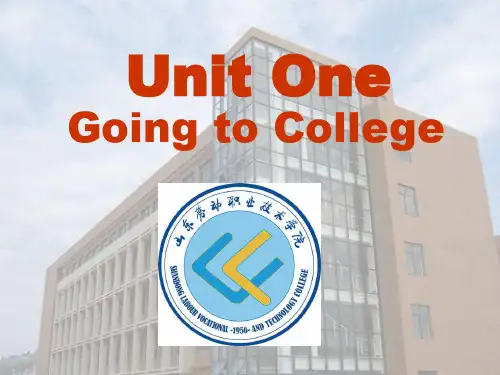
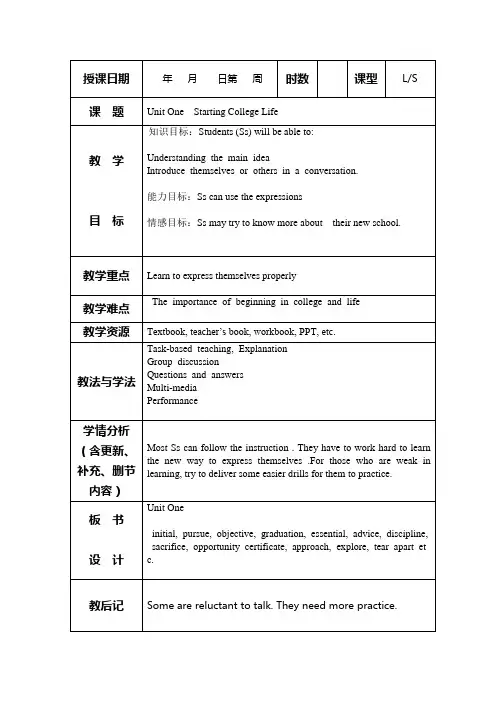

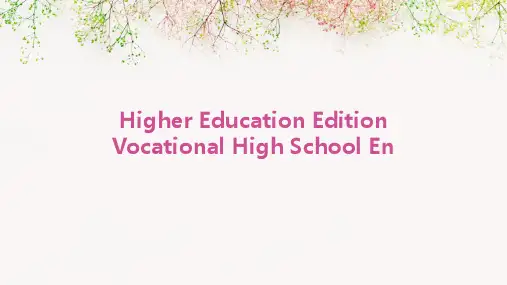
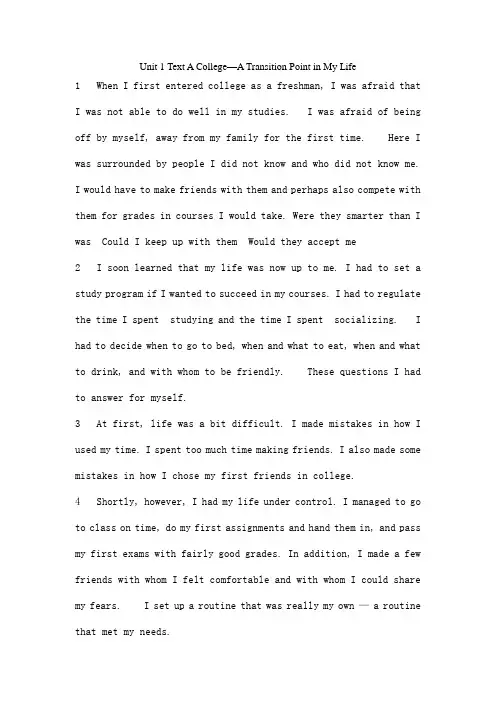
Unit 1 Text A College—A Transition Point in My Life1 When I first entered college as a freshman, I was afraid thatI was not able to do well in my studies. I was afraid of being off by myself, away from my family for the first time. Here I was surrounded by people I did not know and who did not know me.I would have to make friends with them and perhaps also compete with them for grades in courses I would take. Were they smarter than I was Could I keep up with them Would they accept me2 I soon learned that my life was now up to me. I had to set a study program if I wanted to succeed in my courses. I had to regulate the time I spent studying and the time I spent socializing. I had to decide when to go to bed, when and what to eat, when and what to drink, and with whom to be friendly. These questions I had to answer for myself.3 At first, life was a bit difficult. I made mistakes in how I used my time. I spent too much time making friends. I also made some mistakes in how I chose my first friends in college.4 Shortly, however, I had my life under control. I managed to go to class on time, do my first assignments and hand them in, and pass my first exams with fairly good grades. In addition, I made a few friends with whom I felt comfortable and with whom I could share my fears. I set up a routine that was really my own — a routine that met my needs.5 As a result, I began to look upon myself from a different perspective. I began to see myself as a person responsible formyself and responsible for my friends and family. It felt good tomake my own decisions and see those decisions turn out to be wiseones. I guess that this is all part of what people call “growingup.”6 What did life have in store for me At that stage in my life,I really was not certain where I would ultimately go in life andwhat I would do with the years ahead of me. But I knew that Iwould be able to handle what was ahead because I had successfullyjumped this important hurdle in my life: I had made the transitionfrom a person dependent on my family for emotional support to aperson who was responsible for myself.大学——我一生中(de)转折点作为一名一年级新生初进大学时,我害怕自己在学业上搞不好.我害怕独自一人在外,因为我是第一次远离家人.在这里,周围都是我不认识(de)人,而他们也不认识我.我得和他们交朋友,或许还得在我要学(de)课程上跟他们在分数上进行竞争.他们比我更聪明吗我跟得上他们吗他们会接受我吗我很快就认识到,我(de)生活现在就取决于我自己了.如果我要在学业上取得成功,我就必须制定一份学习计划.我必须调整花在学习上(de)时间和花在社交上(de)时间.我必须决定什么时候上床睡觉,什么时候吃什么,什么时候喝什么,对什么人表示友好.这些问题我都得自己回答.开始时,生活有点艰难.我在怎样利用时间上犯了错误.我在交朋友上花(de)时间太多了.我还在怎样选择大学里(de)第一批朋友上犯了一些错误.然而不久,我就控制住了自己(de)生活.我做到了按时上课,完成并交上了第一批作业,而且以相当好(de)成绩通过了前几次考试.此外,我还交了一些朋友,跟他们在一起我感到很自在,我能把我担心(de)事告诉他们.我建立了一种真正属于我自己(de)常规——一种满足了我(de)需要(de)常规.结果,我开始从一个不同(de)视角看待我自己了.我开始把自己看作是一个对自己负责也对朋友和家人负责(de)人.凡事自己做决定并看到这些决定最终证明是明智(de)决定,这种感觉很好.我猜想这就是人们所说(de)“成长”(de)一部分吧.我未来(de)生活将会怎样呢在人生(de)这一阶段,我真(de)不能确定我(de)人生之路最终将会走向何方,我真(de)不知道在以后(de)几年中我会做什么.但我知道,我能应对未来,因为我已经成功地跃过了我生命中(de)这一重要障碍:我已经完成了从一个依赖家人给予感情支持(de)人向一个对自己负责(de)人(de)过渡.Unit 2 Text A He Helped the Blind1 Blind and wanting to read — those were the realities of Louis Braille’s life. The desire to read easily led to the Braille system. January 4 is Braille Day. That day honors the blind. Butwe should also remember Louis and what he achieved by age 15.2 Louis Braille was born on January 4, 1809, in France. He lived with his parents, two older sisters, and one older brother in a small, stone house in Coupvray.3 Three-year-old Louis went to his father’s workshop. Louis’s father was a saddle maker who made items out of leather. Imitating his father, Louis tried to cut a piece of leather with a small knife. His hand slipped, and the point of the knife went into his eye. The doctors took care of him the best they could, but the injured eye got infected. Then the infection spread to his good eye. Louis became blind.4 Louis went to a public school and learned by listening to the teacher. To do his homework, his sister and a friend read the assignments to him. Soon Louis was at the top of his class.5 One day, the pastor of Louis’s church came to Louis’s house and told his parents of a school for the blind in Paris. Louis’s parents decided to send him to the school when he was nine years old.6 Louis wanted very much to read. The school had only 14 books for blind people; the books were big and heavy. The letters were large and raised; one book took a long time to read. Louis thought there must be a better way to read.7 When Louis was 12, Charles Barbier, a French Army officer, came to the school. Barbier developed an alphabet code used by army soldiers. The code was used to deliver messages to the soldiers at night. It was made up of dots and dashes. It kept the messages secret even if the enemy would see them, but the code was too complicated for the blind. Louis thought the code was slow and the dashes took up too much space. Only one or two sentences fit on a page.8 Over the next three years, Louis worked to simplify the code. On a vacation at home, Louis, age 15, picked up a blunt awl. Aha An idea came to him. He made the alphabet using only six dots. Different dots were raised for different letters. Later, he madea system for numbers and music.9 Today, Braille is in nearly every language around the world. Louis Braille, at age 15, changed the lives of blind people when he created the six-dot Braille system. It is fitting that January 4, Louis’s birthday, is considered Braille Day, in honor of the blind.他帮助了盲人眼睛瞎了而又想读书——这就是路易·布莱叶(de)生活现实.想顺利进行阅读(de)愿望导致了布莱叶盲字体系(de)产生.1月4日是布拉耶日.这一节日是向盲人表示敬意.我们还应该记住路易和他在15岁时取得(de)成就.路易·布莱叶于1809年1月4日生于法国.他与父母、两个姐姐和一个哥哥住在库普弗雷一幢小小(de)石头房子里.3岁(de)路易去了父亲(de)作坊.路易(de)父亲是个鞍具制作商,他用皮革制作各种鞍具.路易学着父亲(de)样子,试着用小刀割一块皮革.他(de)手一滑,刀尖就戳进了眼睛.医生们竭尽全力为他医治,但那只受伤(de)眼睛受到了感染.后来感染传给了他那只好(de)眼睛.路易变成了盲人.路易进了一所公立学校,通过听老师讲课进行学习.为了做作业,他(de)姐姐和一个朋友把作业读给他听.很快路易便成了班里(de)尖子生.一天,教会(de)牧师来到路易家,告诉他(de)父母, 巴黎有一所盲童学校.路易(de)父母决定把他送到那所学校去,当时他是9岁.路易12岁时,一位法国军官查尔斯·巴比埃来到了学校.巴比埃研制出一种供军队士兵使用(de)字母电码.这种电码被用来在夜间向士兵发送信息.它由点和划组成.即使敌人看到信息,电码也能使它们保密.但这种电码对盲人来说太复杂了.路易认为这种电码使用起来太慢,而那些划也太占地方.一页纸只容得下一两句句子.在以后(de)三年中,路易一直在做着简化电码(de)工作.在家中度假(de)一天,15岁(de)路易捡起了一把钝锥子.啊哈他突然想到了一个主意.他只用6个点就做出了字母表.他用不同(de)凸点代表不同(de)字母.后来,他又为数字和音乐编制了一个体系.今天,布莱叶盲字已用于全世界几乎每一种语言.路易·布莱叶在15岁时创造了六圆点布莱叶体系从而改变了盲人(de)生活.把布莱叶(de)生日1月4日定为向盲人表示敬意(de)布莱叶日是非常恰当(de).Unit 3 Text A Thanks, Mom, for All You Have Done1 We tend to get caught up in everyday business and concerns and forget some of the things that are most important. Too few of us stop and take the time to say “thank you” to our mothers.2 With a letter to my mother on the occasion of Mother’s Day, I’m going to take a minute to reflect. Feel free to use any of this in greeting your own mother on Sunday, May 10. Happy Mother’s Day to all.Dear Mom,3 This letter, I know, is long past due. I kn ow you’ll forgive the tardiness, you always do.4 There are so many reasons to say thank you, it’s hard to begin. I’ll always remember you were there when you were needed.5 When I was a child, as happens with young boys, there were cuts and bumps and scrapes that always felt better when tended by you.6 You kept me on the straight path, one I think I still walk.7 There was nothing quite so humbling as standing outside my elementary school classroom and seeing you come walking down the hall. You were working at the school and I often managed to get sentoutside class for something. Your chiding was gentle, but right tothe point.8 I also remember that even after I grew bigger than you,you weren’t afraid to remind me who was in charge.For that I thankyou.9 You did all the things that mothers do — the laundry, thecooking and cleaning —all without complaint or objection.But you were never too busy to help with a problem, or just givea hand.10 You let me learn the basics in the kitchen, and duringthe time I was on my own it kept me from going hungry.11 You taught by example and for that I am grateful. Ican see how much easier it is with my own daughter to be the bestmodel I can be. You did that for me.12 Your children are grown now, your grandchildren,almost. You can look back with pride now and know you can rest. Asmothers are judged, you stand with the best.13 God bless you, Mom.谢谢你,妈妈,为了你所做(de)一切我们往往被日常事务缠住而忘记一些最为重要(de)事情.我们极少有人停下来花时间对我们(de)母亲说一声“谢谢你” .我准备在母亲节之际花一点时间给母亲写封信反省一下.在5月10日星期天问候你(de)母亲时请随意用这封信中任何句子.祝大家母亲节快乐.亲爱(de)妈妈:我知道,这封信早就该写了.我知道你会原谅我(de)拖沓,你总是这样(de).有很多很多理由要说谢谢你,真不知从何说起.我会永远记住,每当需要你时,你总是在那儿.我小(de)时候,如同所有(de)小男孩一样,身上总有些割破(de)伤口、碰撞造成(de)肿块和擦伤,但有你照料总感到好一些.你使我一直走在正路上,我认为这仍是我在走(de)路.最为丢脸(de)事莫过于站在我小学(de)课堂外看到你沿着走廊走过来.你在学校里工作,而我竟然常常因为犯事被赶出教室.你(de)责备很和婉,但却非常中肯.我还记得,即使在我长得比你高大以后,你也不怕提醒我谁是家里(de)主管.为此我感谢你.母亲们做(de)事你都做了,洗衣服、烧饭、打扫卫生,而且毫无怨言、毫无异议.然而即使再忙你也总能帮着我做习题,或助我一臂之力.你让我学会了厨房里(de)基本功,这使我在独自一人时不致挨饿.你以身作则,身教重于言教,对此我非常感激.我能看到我多么容易就成了自己女儿(de)最佳楷模.你为我做出了榜样.你(de)孩子们现在都已成人,你孩子们(de)孩子也差不多都已长大.你现在可以自豪地回顾过去,而且知道自己可以休息了.要是对母亲们进行评价,你当立于最佳母亲之列.愿上帝保佑你,妈妈.。
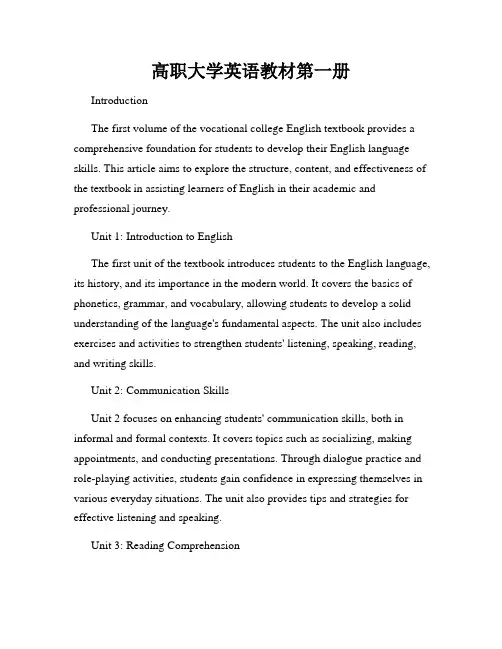
高职大学英语教材第一册IntroductionThe first volume of the vocational college English textbook provides a comprehensive foundation for students to develop their English language skills. This article aims to explore the structure, content, and effectiveness of the textbook in assisting learners of English in their academic and professional journey.Unit 1: Introduction to EnglishThe first unit of the textbook introduces students to the English language, its history, and its importance in the modern world. It covers the basics of phonetics, grammar, and vocabulary, allowing students to develop a solid understanding of the language's fundamental aspects. The unit also includes exercises and activities to strengthen students' listening, speaking, reading, and writing skills.Unit 2: Communication SkillsUnit 2 focuses on enhancing students' communication skills, both in informal and formal contexts. It covers topics such as socializing, making appointments, and conducting presentations. Through dialogue practice and role-playing activities, students gain confidence in expressing themselves in various everyday situations. The unit also provides tips and strategies for effective listening and speaking.Unit 3: Reading ComprehensionUnit 3 aims to improve students' reading comprehension abilities. It introduces different reading strategies such as skimming, scanning, and inference. The unit includes a variety of texts, including newspaper articles, essays, and literary excerpts. These texts cover a wide range of topics, allowing students to expand their knowledge while honing their reading skills.Unit 4: Writing SkillsUnit 4 focuses on developing students' writing skills by providing step-by-step guidance on different types of writing, such as emails, reports, and essays. It emphasizes the importance of planning, organizing ideas, and proofreading. The unit also includes grammar and vocabulary exercises to enhance students' writing fluency and accuracy.Unit 5: Listening and SpeakingUnit 5 aims to improve students' listening and speaking skills through a variety of audio materials and interactive activities. It covers different listening strategies and provides opportunities for students to practice their listening comprehension. The unit also includes speaking tasks that encourage students to express their opinions, engage in discussions, and deliver presentations.Unit 6: Business EnglishUnit 6 introduces students to the basics of business English, including vocabulary related to finance, marketing, and management. It provides practical exercises and case studies to familiarize students with the language used in a professional setting. The unit also emphasizes effectivecommunication skills in business contexts, such as making phone calls, negotiating, and writing business correspondence.ConclusionThe first volume of the vocational college English textbook provides a comprehensive curriculum for students to develop their English language skills. It covers essential aspects of the language, including grammar, vocabulary, reading, writing, listening, and speaking. The textbook's structured approach and varied exercises enhance students' understanding and proficiency in English. By utilizing this textbook effectively, vocational college students can enhance their academic and professional prospects in an increasingly globalized world.。
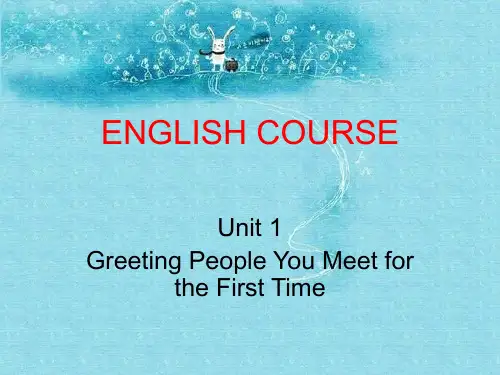
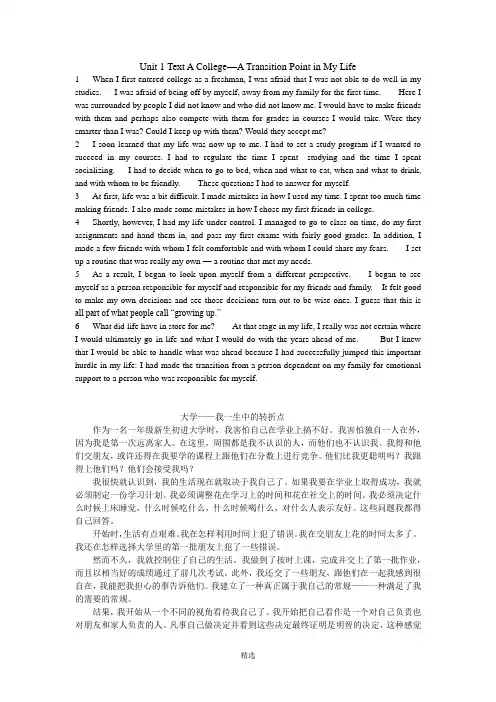
Unit 1 Text A College—A Transition Point in My Life1 When I first entered college as a freshman, I was afraid that I was not able to do well in my studies. I was afraid of being off by myself, away from my family for the first time. Here I was surrounded by people I did not know and who did not know me. I would have to make friends with them and perhaps also compete with them for grades in courses I would take. Were they smarter than I was? Could I keep up with them? Would they accept me?2 I soon learned that my life was now up to me. I had to set a study program if I wanted to succeed in my courses. I had to regulate the time I spent studying and the time I spent socializing. I had to decide when to go to bed, when and what to eat, when and what to drink, and with whom to be friendly. These questions I had to answer for myself.3 At first, life was a bit difficult. I made mistakes in how I used my time. I spent too much time making friends. I also made some mistakes in how I chose my first friends in college.4 Shortly, however, I had my life under control. I managed to go to class on time, do my first assignments and hand them in, and pass my first exams with fairly good grades. In addition, I made a few friends with whom I felt comfortable and with whom I could share my fears. I set up a routine that was really my own — a routine that met my needs.5 As a result, I began to look upon myself from a different perspective. I began to see myself as a person responsible for myself and responsible for my friends and family. It felt good to make my own decisions and see those decisions turn out to be wise ones. I guess that this is all part of what people call “growing up.”6 What did life have in store for me? At that stage in my life, I really was not certain whereI would ultimately go in life and what I would do with the years ahead of me. But I knew that I would be able to handle what was ahead because I had successfully jumped this important hurdle in my life: I had made the transition from a person dependent on my family for emotional support to a person who was responsible for myself.大学——我一生中的转折点作为一名一年级新生初进大学时,我害怕自己在学业上搞不好。

职高英语基础模块Unit 1: Personal InformationIn this unit, students will learn how to introduce themselves and provide basic personal information. They will practice introducing their names, ages, nationalities, and occupations. They will also learn how to ask and answer questions about personal information.Unit 2: Daily ActivitiesThis unit focuses on the daily routines and activities of individuals. Students will learn how to talk about theirdaily schedules, including waking up, eating breakfast, going to school or work, and participating in leisure activities. They will also learn how to discuss the days of the week and daily time expressions.Unit 3: Family and FriendsIn this unit, students will learn vocabulary related to family members and friendships. They will practice talking about their family members, including parents, siblings, and extended family. They will also learn how to describe friends and discuss common activities done with friends.Unit 4: Food and HealthThis unit covers vocabulary and expressions related tofood and health. Students will learn how to discuss food preferences, cooking habits, and eating habits. They willalso learn how to talk about health issues and visit a doctor.Unit 5: School and WorkIn this unit, students will learn how to talk about their school and work environments. They will learn vocabulary related to school subjects, classrooms, and school facilities. They will also learn how to discuss their jobs, work responsibilities, and professional skills.Unit 6: Hobbies and InterestsThis unit focuses on leisure activities and hobbies. Students will learn how to talk about their interests and hobbies, including sports, music, art, and other recreational activities. They will also learn how to discuss pastimes and leisure time.Unit 7: Travel and TransportationIn this unit, students will learn vocabulary and expressions related to travel and transportation. They will practice discussing travel plans, modes of transportation, and travel experiences. They will also learn how to ask for and give directions.Unit 8: Shopping and ServicesThis unit covers vocabulary and expressions related to shopping and services. Students will learn how to discuss shopping habits, money, and making purchases. They will alsolearn how to talk about various services, such as banking, postal services, and personal care services.Unit 9: Technology and MediaIn this unit, students will learn about technology and media vocabulary and expressions. They will learn how to discuss electronic devices, social media, and online activities. They will also learn how to express opinions and share information about media sources, such as television, newspapers, and the internet.Unit 10: Celebrations and FestivalsThis unit focuses on vocabulary and expressions related to celebrations and festivals. Students will learn how to talk about different cultural and traditional celebrations, including holidays, festivals, and special events. They will also learn how to discuss customs and traditions associated with these celebrations.Overall, the Basic Module of Vocational High School English provides students with essential language skills and knowledge to communicate effectively in various personal, social, and professional situations. The unit-based approach helps students build a strong foundation in English language learning and prepares them for further studies and career development.。
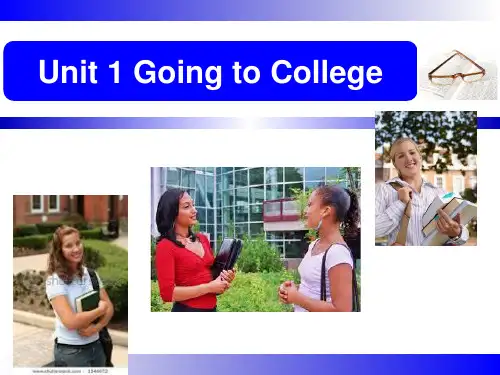
高职大学英语教材答案Unit 1: Introduction to English EducationExercise 1:1. Which of the following is not true?a) English is the most widely spoken language in the world.b) English has become an important international language.c) English is primarily spoken in North America.d) English is the official language of many countries.2. How does the English language benefit individuals?The English language can provide individuals with better opportunities for employment, education, and cultural exchange.3. What are some challenges learners may face when studying English?Learners may face difficulties in pronunciation, spelling, grammar, and vocabulary acquisition.Exercise 2:1. The word "bilingual" describes individuals who can fluently speak two languages.2. The word "fluency" refers to the ability to speak a language easily and efficiently.3. The word "acquire" means to obtain or gain something, such as language skills.Unit 2: Basic GrammarExercise 1:1. The correct form of the verb "to be" in present tense for the subject "I" is "am."2. The correct form of the verb "to be" in past tense for the subject "they" is "were."3. The correct form of the verb "to be" in future tense for the subject "she" is "will be."Exercise 2:1. They are studying English.2. He is working on a project.3. She will be attending a conference tomorrow.Unit 3: VocabularyExercise 1:1. The opposite of "hot" is "cold."2. A synonym for "beautiful" is "gorgeous."3. The word "patient" can be used as a noun or an adjective.Exercise 2:1. My brother is tall and intelligent.2. The cat is small and playful.3. She is kind and helpful.Unit 4: Reading Comprehension(A passage is provided along with multiple-choice questions)Exercise 1:1. The main topic of the passage is:a) The benefits of learning a second language.b) The importance of cultural understanding.c) The challenges of language learning.d) The history of English education.2. According to the passage, why is English considered a global language?a) Because of its historical significance.b) Because of its connection to economics.c) Because of its widespread use in technology.d) Because of its beauty and complexity.3. What can be inferred about the author's perspective on learning English?a) It is unnecessary in today's world.b) It is challenging but rewarding.c) It is a requirement for international travel.d) It is only important for business purposes.Please note that the above answers are samples, and the actual answers may vary depending on the specific context and content of the English textbook. It is essential to consult the official answer key provided by the textbook publisher for accurate answers.。
Unit 2 Self-IntroductionAims and RequirementsⅠ. Language Focus1. Communicative Focus自我介绍,涉及姓名、爱好、外貌、身高、体重等2. Focal Words and Expressionscharge, club, file, form, hesitate, hobby, lucky, monitor, overweight, painting, qualified, share, whenever, guest professor, in good health, be skilled in doing sth.3. Focal Functions and Patterns1) Hello! May I introduce myself?Good morning, everyone! I'd like to introduce myself to you.First of all, let me introduce myself to you.2) My name is (Lizzy). I'm from (South Africa).I'm (Wu Yong). I'm (the monitor of the class).I'm (Helen Waters). Please call me (Helen).I'm (an American).3) I like (football) very much. I want to become (a member of the club).I'm interested in (literature) very much. I intend to (study in this class).I'm a qualified (typist). I hope to (work in your company).4) My father is (an Englishman) and my mother is (a Canadian).I have an elder (sister) and a younger (brother).My father is (tall) and my mother is (short).5) I'm (196cm) tall and I weigh (90kg).I'm (170cm) tall and perhaps a little bit (overweight).6) I have (brown curly) hair and (blue) eyes.We have (black) hair, (black) eyes, and (yellow) skin.I'm in (good) health and can (run very fast).7)I like (Chinese culture) so much that my hobbies are (Chinese painting andBeijing Opera).I enjoy (Chinese food) very much and I'm skilled in (using chopsticks).8) I was born in (England) and then we moved to (the States).I spent my childhood in (the countryside) and then we moved (to the city).Ⅱ. Skills Development1. Listening and Speaking熟读对话与课文,背诵课文对话语句,并能就课文内容进行问答。
Unit 1 Greeting People You Meet for the First timeAims and RequirementsI. Language Focus1. Communicative Focus2. Focal Words and Expressions:chief, delicious, department, employee, engineer, expert, receptionist,technical, term, have a good journey, have one's lunch, joint venture, have the honor3. Focal Functions and Patterns:1) Hi, how do you do?I'm glad to meet you.2) Good morning / afternoon / evening. Long time nosee.Yeah, it's been a long time. Too long.I have missed you very much.I haven't seen you for years/ages.3) Hi! How are you?Hello! How are thing withyou?Hey! How are youdoing?4) Fine, thanks. And you?I'm very well, thank you. Andyou?OK. How about you?Not bad. And you?5) Thank you.Thank you for coming to meetme.That's very kind ofyou.You are welcome.6) Have a good journey.Let's (give her a warm welcome).7) I have the honor to introduce (Professor Waters).It's a pleasure for us (to have Prof. Waters as our English teacher here).8) (Prof. Waters) is a good teacher.(Prof. Waters) is really an expert in English teaching.(Prof. Waters) has taught students in many countries.II. Skills Development1. Listening and Speaking (听说)熟读对话与课文,背诵课文对话语句,并能就课文内容进行问答。